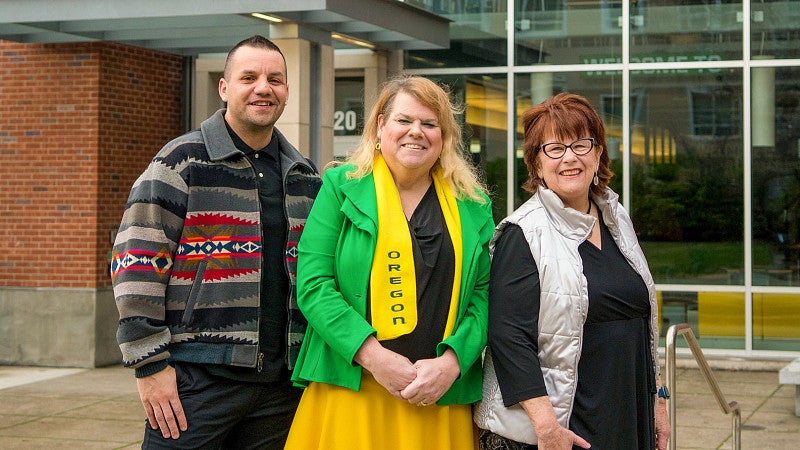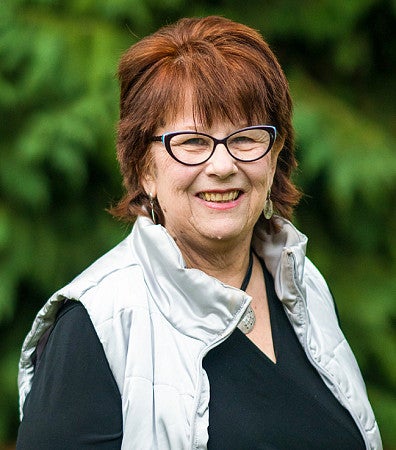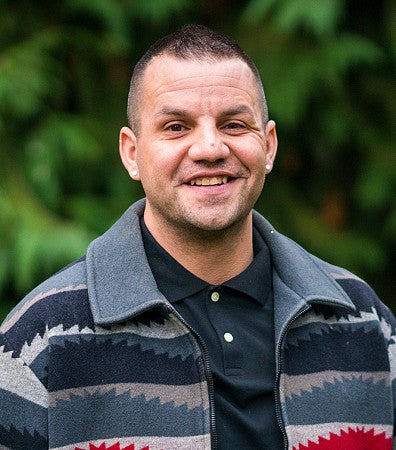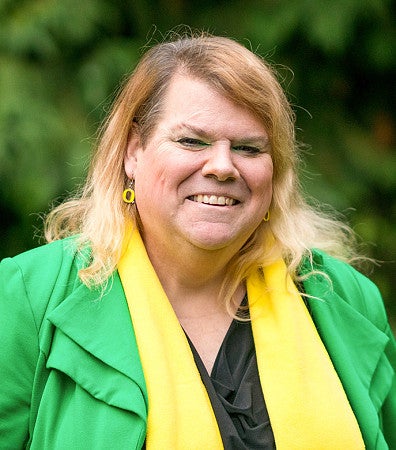
“Uhhhhh … are you sure you want to work for the state?”
As three UO School of Journalism and Communication (SOJC) graduates with diverse identities spanning a quarter-century of SOJC education, we have all been asked this question while working in communication for the Oregon Department of Human Services (ODHS). Our careers here prove we are very sure.
Each of our paths to state communications jobs is different. Even so, all of us know one thing: Our SOJC experiences strongly affect our work today. Even before words such as “equity” and “inclusion” were considered important facets of communication, the SOJC instilled in us how to understand, value and use those and other critical concepts in our work in our own and other marginalized communities. Very simply, everything we do as communicators for ODHS is something we care about.
Not that it was always that way. Here are our stories.

Macy Guppy
Ph.D. ’97 (Communication and Society), Writer and EditorWhen I received my doctorate all those years ago, I thought I would spend the rest of my career as a college professor. Before starting the SOJC’s doctoral program, I had carried my long-held values of equity and social responsibility into a nonprofit communication and marketing career, which led me to part-time teaching. Despite a stimulating career, I was ready for the ultimate intellectual experience when I started at the SOJC. And it did not disappoint, thanks to amazing professors and students.
My SOJC experience amplified my desire and ability to pass on what I had learned, especially to teach critical thinking to communication students. After teaching a few years, life took another turn — one I never imagined in my UO days, but one that makes perfect sense. I went to work for the state of Oregon as a writer and editor.
When I was first hired in 2007, equity at our agency was mainly performative, such as sponsoring a diversity picnic with cooking demonstrations. Our society at that time seemed focused more on how to be nice to each other than on grappling with the tough issues of diversity, inclusion and equity.
Over the years, the agencies have greatly expanded their equity focus and continually strive to center those values in everything we do. Recently, I’ve been privileged to facilitate several equity language projects for both the ODHS and the Oregon Health Authority. All the writing skills and critical thinking I honed at the SOJC merge in this work in a way I never imagined when I finished my degree.
Now, at the end of my career, I work with experts in health and human services who teach me, every day, how to live my values and serve the people of Oregon. It has been a great unexpected joy to work here for the last 15 years. And though I no longer teach college students, I do teach, just in a different way, mentoring younger communications professionals as well as co-writing and teaching grammar and style.
—Macy Guppy, Ph.D. ’97, retired from Publications and Creative Services in 2021, a shared service supporting the ODHS and the Oregon Health Authority. She now contracts with ODHS and OHA as a writer, editor and project facilitator.

Tony Aaron Fuller
B.S. ’05 (Journalism), Tribal Affairs Communication SpecialistAs a first-generation college student and enrolled member of the Confederated Tribes of the Colville Indian Reservation, I wasn’t sure how I would navigate a career path. Getting to go to college was a huge opportunity in and of itself. I just knew that whatever I did after college would have something to do with amplifying the voice of American Indian communities throughout the Pacific Northwest.
I decided I wanted to be one of the first on-air American Indian news anchors in Oregon, which happened after I graduated in 2005 with my bachelor’s in electronic media. After three years working for NBC Universal, I decided to pursue policy and change. I had talked about the successes and struggles of Tribal communities on television, but I wasn’t contributing to the advancement of the diverse Tribal communities I was a product of.
Now, years later, I am the Tribal Affairs communication specialist with the ODHS. I have combined my education, my identity and my culture in a way that amplifies the Tribal voice. I work as a liaison between a state agency and the Nine Tribes of Oregon to continually re-establish trust, develop culturally responsive programming and create a communication intention that honors the history of Oregon’s Tribal communities. I represent the Native people who came before me, who were overlooked and at times neglected. I am honored and deeply passionate about focusing my work on making sure the Nine Tribes of Oregon have allies, advocates and partners at ODHS that ensure the mission of providing services to improve the lives of American Indian and Alaska Natives living in my home state of Oregon.
—Tony Aaron Fuller, B.S. ’05, is the tribal affairs communication specialist for ODHS and an enrolled member of the Colville Confederated Tribes.

Bethany Grace Howe
Ph.D. ’19 (Media Studies), Communication SpecialistMy transgender identity didn’t reveal itself in my heart or life until I started my transition just weeks into my four-year Ph.D. program. I came out in a school-wide email and quickly became what my advisor called “the transgender poster child for the School of Journalism.” This role defined my time there. Volunteer service to the school became my passion. Supportive faculty such as Ed Madison, Dean Mundy, Julianne Newton and Dean Juan-Carlos Molleda made me feel safe living and analyzing my transgender life — resulting in a dissertation and five peer-review papers.
After graduation, however, I struggled with my future. My volunteer service and still-unpublished papers didn’t matter to academia. More important, my daughter lives on the Oregon coast and I refused to move any farther from her. As a result, I tried a couple of ventures as an entrepreneur. Neither serviced my soul — nor my wallet.
Eventually, I went to work for ODHS after Oregon’s 2020 fires. Taking an entry-level job, I wanted to help friends affected by the Echo Mountain Fire. Within a few months, I moved into the job I have today: communications specialist. I work remotely, so I see my daughter more than ever.
Unlike Tony, my official title does not include my identity — but my job does. I am asked to use my experiences as a transgender person and advocate every day. I lead several work groups that are literally rewriting the book on how we communicate to and for all marginalized people in Oregon. Much of this is a result of my service to the SOJC — something my wallet appreciates, too.
Today, my work is used by my peers, my supervisors — all the way up to the governor. I see the changes I’ve helped to make being used by communicators throughout the state, and not just in support of transgender people. It’s for all of us.
—Bethany Grace Howe, Ph.D. ’19, is a communication specialist for ODHS in support of the Stabilization and Crisis Unit.
Uhhh, yes … I’m sure I want to work for the state
Whether our SOJC experiences were 25 years ago or five, all three of us admit that, when we graduated, it never crossed our minds to work for the government. We hope you will not make the same mistake.
Now we see the connections between our current careers and our time in the SOJC. Perhaps, ironically, our experiences pursuing other service paths on the way here taught us one thing: Being allowed representation is the key to making the best use of our skills and passions.
Every day we get to combine who we are, what we are trained to do and what we care about.
When we propose something at work, we each start with the genuine belief that something that will make life better for others is actually going to happen. This belief is not a function of seniority or job title; it’s part of our ever-evolving culture.
We get it: Putting your communication degree to work for the state of Oregon might not seem like your dream job. But, for three SOJC grads, it turned out to be, and we hope you’ll consider joining us.
